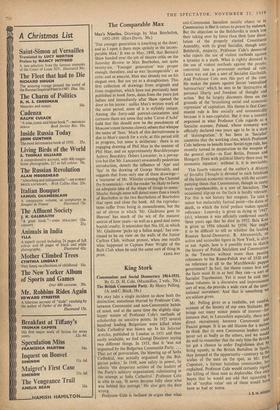The Comparable Max
Max's Nineties. Drawings by Max Beerbohm, 1892-1899. (Hart-Davis, 30s.) 'Ti* younger generation is knocking at the door; and as I open it there steps spritely in the incom- parable Max.' It was in May, 1898, that Bernard Shaw handed over the job of theatre critic on the Saturday Review to Max Beerbohm, not quite twenty-six. 'Younger generation' was proper enough, therefore, and so was 'incomparable': as critic and as essayist, Max was already out on his elegant own. But not yet as a draughtsman. This first collection of drawings from originals and from magazines, which have not previously been published in book form, dates from the years just before and immediately after Shaw opened the door to his 'junior : unlike Max's written work of the same period, none of it is stylishly unique. Among the forty-odd portrait-caricatures and cartoons there are some that echo 'Cam d'Ache (odd that this should now be the pseudonym of Moscow's most famous clown); others that whisper the name of 'Sem.' Much of this derivativeness is due to Max's search for a style, at this period still in progress, but some is deliberate : there is an engaging drawing of Phil May in the manner of Phil May, and an approximately Beardsleyesque Aubrey Beardsley. Osbert Lancaster, in a percep- tive but (for Mr. Lancaster) unwontedly pedestrian introduction, detects the influence of 'Ape' and 'Spy' in the drawing of George Meredith, and suggests that from only one of these drawings— a 'nocturne' of Mr. Whistler crossing the Channel (by broomstick)—will the reader 'be likely to form an adequate idea of the shape of things to oome.' Maybe, though some will detect more than a touch of Beerbohm in the two Beerbohms of Beerbohm that open and close the book. All the reproduc- tions suffer from being in monochrome, but the set of eleven in which 'Mr. Gladstone goes to Heaven' has much of the wit of the maturer satirist of later years—as well as a good deal more boyish cruelty. It astonishes that No. III, in which Mr. Gladstone 'picks up a fallen angel,' has con- tinued to be on view on the walls of the Junior Carlton Club, without protest, when one recalls whit happened to Captain Peter Wright of the Bath Club when he said the same sort of thing in














































































 Previous page
Previous page